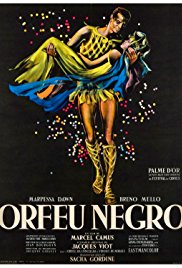Orfeu Negro (Black Orpheus) is a romantic tragedy film made in Brazil by French director Marcel Camus. It is based on the retelling of the Orpheus and Eurydice myth of Ancient Greece. The setting of the movie is the annual Carnival in Rio de Janeiro. Orpheus, the hero of this movie, falls in love with Eurydice and together they embark on a tough journey to achieve their love. Eurydice runs away from her house to avoid a man who she claims is trying to kill her. She arrives in Rio to stay with her cousin Serafina and meets Orpheus. Throughout the festivities of the Carnival, they fall in love and face the difficulties of being together. In the end, it is up to Orpheus to make the choice of not looking back to keep Eurydice by his side or to lose her forever.
Camus opens the film by engaging spectators in a scene of tribal drumming and dance. Music plays a big role throughout this movie. It sets the tone for the scenes presented and the emotions of the characters. The movie does a great job of depicting the diversity in Brazil because of the melting pot of different cultures brought by the slaves. This movie also shows the influence of indigenous people in Brazil. This is shown at the end when the Native Americans participating in the ceremony try to contact the spirits by performing rituals that are guiding these spirits. An ethnocentric critique of the movie would be the depiction of the Afro-Brazilian people living in favelas. It shows that they have do not have a care for anything and that they spend most of their time dancing and singing. It does not show the racial discrimination they have to face in everyday life and the hardships of the conditions that they are living in.
Black Orpheus relates to the course material through the depiction of African culture in Brazil. It shows the religion brought to Brazil by African slaves who blended their religious beliefs with Catholicism, which is embedded in Brazilian beliefs. It depicts the warmth and liveliness of the Afro-Brazilian culture that Brazilians have adapted by their taste in music, dance, food, and much more. Overall, the movie was a great take of the old myth with a new twist. I would defiantly recommend this movie to anyone interested to take a peak of the Brazilian culture in 1950’s, and also for the great music in the movie

